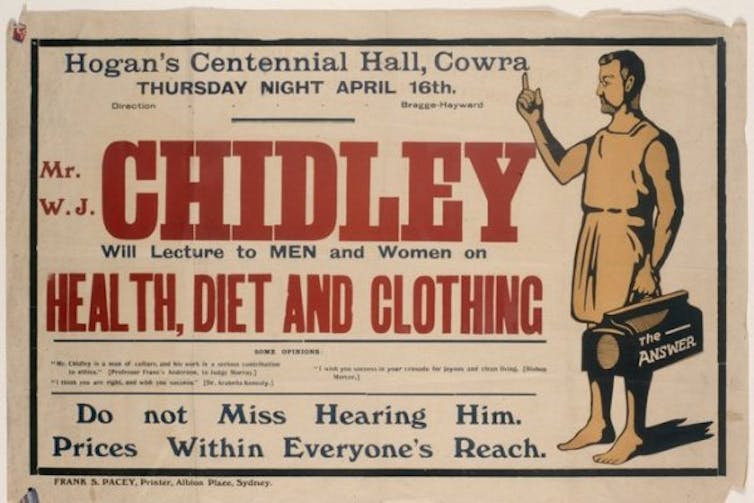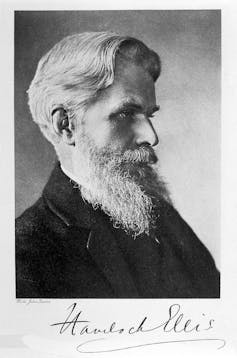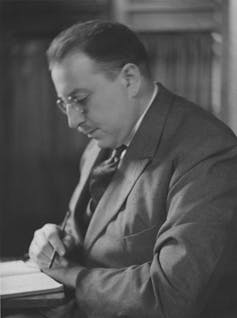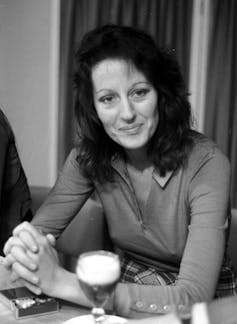A nursery of unconventional ideas – sex radicalism in Australia
- Written by Frank Bongiorno, Professor of History, ANU College of Arts and Social Sciences, Australian National University
Welcome to our series on sexual histories, in which our authors explore changing sexual mores from antiquity to today.
In functioning democracies, yesterday’s radicalism is often today’s orthodoxy. Same-sex marriage was barely on the political agenda in the early years of this century. What a difference a few years can make.
But sometimes yesterday’s radicalism can still disturb the peace today. William Chidley was Australia’s most famous sex radical of a century ago. Chidley wandered the streets of Sydney in a thin tunic selling his booklet, The Answer, for a small fee and preaching his message to anyone willing to listen.
In The Answer, Chidley criticised “the crowbar method” – a none-too-subtle reference to a male erection – of intercourse. He argued that sex between and man and woman should occur only in the spring, when the woman’s vagina would act as a vacuum, drawing the flaccid penis inside. The present unnatural method of coition, Chidley argued, was ruining civilisation. His own method would save it.
 A banner promoting one of Chidley’s talks.
State Library of New South Wales
A banner promoting one of Chidley’s talks.
State Library of New South Wales
Chidley was persecuted by officialdom, declared insane, condemned by doctors, and locked up in jail and an asylum.
But there was also a popular campaign in support of him. Feminists endorsed Chidley’s message of gentleness. Liberals approved his right to speak. Socialists detected a plot to suppress a fellow radical. Still the persecution continued until his death late in 1916.
When in 2013, an innovative young historian in the ABC’s social history unit, Catherine Freyne, made a radio documentary about Chidley, she hired an actor to dress up like him and once again declaim The Answer. How would Sydney react this time round?
Unlike the original Chidley, this one was not arrested. Indeed, among the preoccupied shoppers in the Pitt Street Mall, he attracted little attention at all. But Speakers’ Corner at the Domain was livelier. While the audience was apparently torn between puzzlement and amusement, Chidley was soon being roundly abused by an audience member.
Chidley was not the only sex radical in Australia, although he was, for a time, the most famous. Indeed, Australia has been something of a nursery of unconventional sexual ideas. Rosamund Benham was an early female graduate in medicine from the University of Adelaide who wrote pamphlets grappling with how modern couples could enjoy sex without the harmful effect of male “animal passion”.
In Sense About Sex and Circumvention (credited to “a Woman Doctor”) she turned to Karezza, or “practicable continence”. A couple, she said, should cultivate their self-restraint by embracing each other in a nude state without actual “sexual connection”.
 Henry Havelock Ellis.
Wikimedia Commons
Henry Havelock Ellis.
Wikimedia Commons
If they persisted, they would achieve “the highest delight through a thorough exchange of magnetism”. The idea, unsurprisingly, did not catch on, but her husband and one of his comrades were nonetheless prosecuted and sentenced to brief terms of imprisonment in 1906 — later overturned on appeal — for selling the booklets.
The most famous sexual scientist in the English-speaking world in the first half of the 20th century, Henry Havelock Ellis, had earlier spent four years in country New South Wales working as a teacher. By his own account, this was a critical time in his spiritual and intellectual formation. Ellis then returned to Britain to study medicine and make his name as the author of Studies in the Psychology of Sex (1897-1910).
Chidley sought his friendship and support via a letter. Ellis responded with characteristic kindness, as well as drawing, for his own writings, on the unpublished autobiography Chidley sent him (eventually published as The Confessions of William James Chidley in 1977).
A gender continuum
Australia, meanwhile, continued to produce its own sex radicals, a few of them, like Ellis, globally influential. Norman Haire, a Sydney doctor, went to England in the 1920s and 1930s, making his fortune performing “rejuvenation” operations for wealthy clients, W.B. Yeats among them.
 Norman Haire pictured in the 1940s.
Wikimedia Commons
Norman Haire pictured in the 1940s.
Wikimedia Commons
“Rejuvenation” — which might variously involve a testicle or ovary transplant, x-ray stimulation, or a vasectomy — would supposedly enhance sexual vigour. But Haire was also a pioneering birth controller, sex reformer and prolific author on diverse sexual subjects. He wrote a sex advice column in an Australian’s women’s magazine after returning to Sydney during the second world war.
When the sexual revolution unfolded in the 1960s and 1970s, Australian sex radicals were there again, with British-based expatriates prominent. Richard Neville’s Play Power (1970) celebrated the sexual libertarianism of the international counter-culture while Germaine Greer’s The Female Eunuch, published in the same year, was a feminist landmark as well as a work of sexual libertarianism.
 Germaine Greer in 1970.
Nationaal Archief Fotocollectie Anefo/Wikimedia, CC BY-SA
Germaine Greer in 1970.
Nationaal Archief Fotocollectie Anefo/Wikimedia, CC BY-SA
A few of her ideas, while clothed in the blunt and sometimes Anglo-Saxon language of sexual revolution, belong to a lineage that in Australia stretched back at least to Chidley. “The man who is expected to have a rigid penis at all times,” Greer declared in an article in 1971, “is not any freer than the woman whose vagina is supposed to explode with the first thrust of such a penis.”
But it is perhaps with Dennis Altman’s sex radicalism that we move closest to the preoccupations of our present. Altman, in recent years an academic at Melbourne’s La Trobe University, was the author of the best-selling Homosexual: Oppression and Liberation (1971). It is rightly regarded as a pioneering work of gay scholarship and politics, but it is Altman’s insistence on what we might now call gender fluidity that now seems most striking and prescient.
Liberation, Altman suggested, would allow people to be truly human, instead of being trapped in acting out the roles prescribed by a patriarchal society to “men”, “women”, “heterosexuals” and “homosexuals”.
Drawing on Freud’s concept of “polymorphous perversity”, Altman went so far as to call the final chapter of his book The End of the Homosexual?, arguing provocatively that “the homosexual’s very existence is an affront to the way in which society defines roles, sexuality, and achievement”. In a truly liberated order, he added, “the homosexual as we know him or her may … disappear”.
Here we find, in an earlier form, the notion of a gender continuum that seems so disturbing to modern conservatives. The recent ordeal of the Safe Schools program, and the terms in which the conservative Christian lobby campaigned against same-sex marriage, can be seen in a new perspective once we have this longer history in view.
Ordinary, open-minded citizens
One reason the authorities dealt sternly with Chidley was his habit of addressing audiences that included women and children. The fear — whether sincere or concocted — that children would be damaged by exposure to “progressive” or “radical” sexual ideas has been resilient. For many years, it was a pillar of opposition to sex education in schools. It has been at the heart of the anti-Safe Schools campaign and figured in the unlikely context of the marriage equality debate.
The association of sex radicalism with ambitions to transform society has also aroused fear and hostility. The wider implications of Chidley’s scheme for male sexual privilege were one reason he attracted the support of feminists and the hostility of powerful men. Similarly, the Australian Christian Lobby and the Murdoch press mobilised hostility to Safe Schools on the basis that it was supposedly seeking to impose radical changes to the gender order, as well as to advance a radical socialist or Marxist agenda.
What the wider public thinks of these often confusing culture wars is not easy to fathom. A majority clearly rejected the effort to link marriage equality to the corruption of children.
As Benjamin Law has reported, Safe Schools, in one form or another, survives on the life-support offered by state Labor governments. Many schools are taking their own steps – often with the help of the Safe Schools program – to assist students dealing with the challenges of negotiating sexual and gender identity.
A century ago, while officialdom persecuted Chidley, many ordinary Australians supported him as a sincere battler who deserved a hearing. Today, in these matters as in so many other aspects of Australian life, ordinary citizens sceptical of hyperbole and practical in their concerns are often providing more dynamic leadership than those they elect to lead them.
Tomorrow: sex in convict Australia
Authors: Frank Bongiorno, Professor of History, ANU College of Arts and Social Sciences, Australian National University
Read more http://theconversation.com/a-nursery-of-unconventional-ideas-sex-radicalism-in-australia-88554





